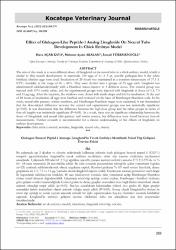Glukagon benzeri peptid-1 analoğu liraglutid’in tavuk embriyo modelinde nöral tüp gelişimi üzerine etkisi
Künye
Açar Kaya, H. , Akalan, M. A. & Türkmenoğlu, İ. (2022). Glukagon Benzeri Peptid-1 Analoğu Liraglutid’in Tavuk Embriyo Modelinde Nöral Tüp Gelişimi Üzerine Etkisi . Kocatepe Veterinary Journal , 15 (3) , 269-274 . DOI: 10.30607/kvj.1103958Özet
Bu çalışmada tip 2 diyabet ve obezite tedavisinde kullanılan inkretin bazlı glukagon benzeri peptid-1 (GLP-1) reseptör agonistlerinden liraglutid’in tavuk embriyo modelinde nöral tüp üzerine etkilerinin incelenmesi amaçlandı. Çalışmada 100 adet 61 ± 5 gr ağırlıkta, spesifik patojen içermeyen fertil yumurta 37.5 ± 0.5°C’de ve % 60 - 68 nem ortamında 28 saat inkübe edildi. Bu süre sonunda pencereleme tekniği ile açılan yumurtalar 4 gruba (n=25) ayrılarak subblastodermik olarak uygulama yapıldı. Kontrol grubuna % 0.9 steril serum fizyolojik, deney gruplarına ise 1.5, 7.5 ve 15 µg/yumurta dozda liraglutid enjekte edildi. Enjeksiyon sonrası pencereler steril drape ile kapatılarak inkübasyona bırakıldı. 48 saat inkübasyon sonunda tüm yumurtalar açılıp Hamburger-Hamilton skalası temel alınarak değerlendirildi. Çalışmada nöral tüp açıklığı, somit sayıları, Hamburger Hamilton skalasına göre gelişim evreleri incelendiğinde kontrol grubu ile deney grupları arasındaki doza bağlı farkın istatistiksel olarak anlamlı olmadığı tespit edildi (p>0.05). Baş-kıç uzunlukları bakımından yüksek doz grubu ile diğer gruplar arasındaki farkın istatistiksel olarak anlamlı olduğu tespit edildi (P<0.05). Sonuç olarak Liraglutid’in dozları ile nöral tüp açıklığı ve somit sayıları arasında anlamlı bir ilişki saptanmazken baş-kıç ölçümleri arasında farklılıklar saptandı. Liraglutid’in embriyo gelişimi üzerine etkilerinin daha net anlaşılması için ileri araştırmalar önerilmektedir. The aim of this study is to scan different doses of Liraglutid on the neural tube in a chick embryo model, which is similar to first month development in mammals. 100 eggs of 61 ± 5 gr, specific pathogen-free 0 day white fertilized chicken eggs were used. Incubation of 28 hours was maintained at a constant temperature of 37.5 ± 0.5°C, humidity in the range of 60 – 68%. They were divided into 4 groups of 25 eggs each. Liraglutid was administered subblastodermically with a Hamilton micro-injector in 3 different doses. The control group was injected with 0.9% sterile saline, and the experimental groups were injected with liraglutide at doses of 1.5, 7.5 and 15 µg/egg. After the injection, the windows were closed with sterile drape and left for incubation. At the end of 48 hours of incubation, all eggs were hatched and evaluated on the basis of Hamburger-Hamilton scale. In the study, neural tube patency, somite numbers, and Hamburger-Hamilton stages were examined, it was determined that the dose-related difference between the control and experimental groups was not statistically significant (p>0.05). It was determined that the difference between the high dose group and the other groups in terms of fore-aft lengths was statistically significant (P<0.05). As a result, there was no significant relationship between the doses of Liraglutide and neural tube patency and somite counts, but differences were found between fore-aft measurements. Further research is recommended for a clearer understanding of the effects of liraglutide on embryo development.



















